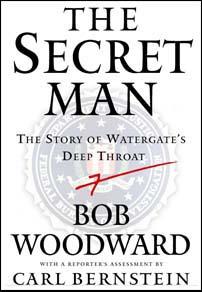 For 33 years, the identity of "Deep Throat"--the anonymous source who helped Washington Post reporters Bob Woodward and Carl Bernstein with their investigation into the Watergate scandal--was kept a secret. Finally, on May 31, 2005, 91-year-old W. Mark Felt stepped forward and admitted "I'm the guy they used to call Deep Throat." Last night I finished reading Bob Woodward's new book, The Secret Man, which chronicles his long personal relationship with Felt, the former #2 man at the FBI (see right).
For 33 years, the identity of "Deep Throat"--the anonymous source who helped Washington Post reporters Bob Woodward and Carl Bernstein with their investigation into the Watergate scandal--was kept a secret. Finally, on May 31, 2005, 91-year-old W. Mark Felt stepped forward and admitted "I'm the guy they used to call Deep Throat." Last night I finished reading Bob Woodward's new book, The Secret Man, which chronicles his long personal relationship with Felt, the former #2 man at the FBI (see right).As Woodward reveals, the world's most famous reporter-source relationship actually began as a friendship through a chance encounter. In 1969, Lt. Bob Woodward was nearing the end of his term in the Navy and was yet undecided on his future. One day on a routine courier assignment to the Nixon White House, he struck up a conversation in the waiting room with a distinguished-looking elderly man who, as luck would have it, was Mark Felt. The young Woodward left an impression on the senior FBI man, who offered encouraging words and allowed the former to call him on later occasions for career advice.
Woodward goes on to describe how Felt's influence steered him away from law school and how he wound up deciding to try his hand at reporting. After being rejected by the Post and enduring a stint at a podunk weekly, Woodward finally managed to join the Post staff covering the lowly local crime beat. What a fateful turn of events then, that the "third-rate burglary" at the Watergate he was assigned to cover would catapult him into the rank of the most celebrated journalist of his time.
The Secret Man has been criticized some for its brisk treatment of the events of the Watergate scandal and focusing more on Woodward himself. Not that there are a dearth of enlightening and entertaining details included here--I enjoyed reading about the elaborate system of communication Felt devised in order to set-up their clandestine meetings in that famous underground parking garage.
 Anyhow, I don't find fault with Woodward for skimming over the Watergate story; after two bestselling books (All the President's Men and The Final Days) about the era, and thirty years of looking back, that story is familiar enough. What is most interesting to me, then, is the story of Woodward himself--how he was able to do what he did and what he was thinking along the way and since. Woodward is the first to admit in his book that despite the warm relationship he once had with Felt, that bond in later years--especially during Felt's post-Watergate legal troubles--was broken. For almost twenty years, until 2000, he had in fact not even spoken to Felt. In The Secret Man's most moving chapter, Woodward describes his emotional reunion with an aged Mark Felt whose memory has deteriorated. Woodward says he has always wrestled with the effects of Watergate on himself and Felt. After Felt's 1980 conviction he realized:
Anyhow, I don't find fault with Woodward for skimming over the Watergate story; after two bestselling books (All the President's Men and The Final Days) about the era, and thirty years of looking back, that story is familiar enough. What is most interesting to me, then, is the story of Woodward himself--how he was able to do what he did and what he was thinking along the way and since. Woodward is the first to admit in his book that despite the warm relationship he once had with Felt, that bond in later years--especially during Felt's post-Watergate legal troubles--was broken. For almost twenty years, until 2000, he had in fact not even spoken to Felt. In The Secret Man's most moving chapter, Woodward describes his emotional reunion with an aged Mark Felt whose memory has deteriorated. Woodward says he has always wrestled with the effects of Watergate on himself and Felt. After Felt's 1980 conviction he realized:For me, Watergate had been a cleansing. For him, it was...the opposite. The two of us saw his actions and their results so differently. I realized, but any reflections on the unfairness of it all only added to my growing feelings of personal responsibility for his plight.
Barring a forthcoming cogent and engaging memoir by Mark Felt himself, this book will be the last important treatment of the Watergate scandal. As the most illuminating personal guide to the most famous political saga in recent history, The Secret Man is a compelling read.
No comments:
Post a Comment